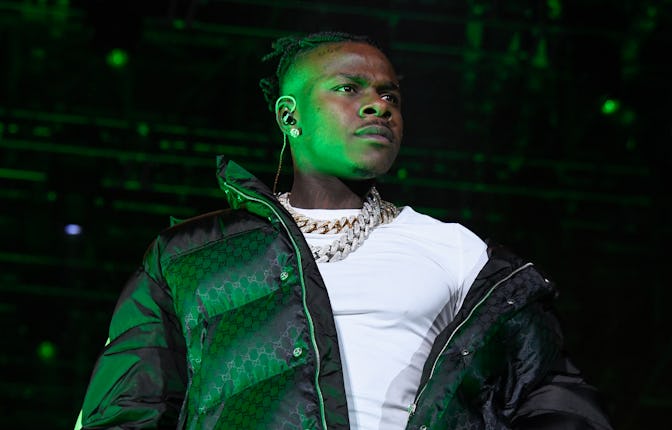Dave Chappelle and DaBaby should both shut up about being canceled
Both men are still rich, loved, and booked after making horrible statements.

This week, cancel culture champions DaBaby and Dave Chappelle were the latest examples of how cancel culture doesn’t exist; it’s just that some celebrities hate accountability.
Thursday night, Dave Chappelle performed in New Orleans at his rescheduled co-headlining show with anti-vax truther and Spotify employee annoyance Joe Rogan —and nothing about the night resembled any of the career debilitations Chappelle has hinted at since being “canceled” from his transphobic The Closer special on Netflix. Earlier this week, the controversial comedian posted a clip on Instagram of a stand-up set in which he bemoaned about being ostracized from film festivals and film studios, leaving his upcoming untitled documentary without a home. The crowd reactions at his New Orleans show drowned out any of his previous paper tears.
At the New Orleans show, Chappelle was greeted with a standing ovation before he uttered a single word. For the next hour, Chappelle dug into “PC culture,” which is really just human decency on a societal scale, and even claimed, “I haven’t been in this much trouble in my life.” If Chappelle actually believes that, or that he’s actually “canceled,” then either his long-term memory is heading towards dementia or he’s wholly oblivious to who makes him the star he is: the fans. The fans are the ones who uproariously laughed during The Closer when he compared trans women’s vaginas to faux meat. Those were the same fans who packed his Radio City Music Hall performances in 2014, helping thrust the once-reclusive comedian back into the national spotlight and into a $60 million payday from Netflix.
The only time he’s been anywhere close to the career-pausing ignominy he thinks comes from cancel culture is when he stopped giving fans what they want: laughs. Before the specials, arena concerts, or complaints about being canceled, Chappelle was being booed during a 2013 set for reading a book on stage, chastising the crowd, and treating a once rare chance fans got to see of the Chappelle Show’s creator as a mere contractual obligation to get paid. A few years later, fans demanded refunds for a Detroit performance which was essentially the inebriated ramblings of a man collecting a check. And even those were just momentary glimpses of “cancelation,” because he went on another 30-date tour just four months after being booed.
Fans booed and promoters kept booking him. The trans community has complained about his offensive jokes since The Age of Spin, his first Netflix special from 2017, and he’s gone on to win three Grammy Awards, five Emmy awards, and release six more Netflix specials. He was never canceled, and neither was his music counterpart DaBaby.
Probably around the same time Chappelle touched the stage to a showering of applause in New Orleans, DaBaby emerged from backstage at music festival Rolling Loud New York during 50 Cent’s performance to a crowd that yelled as loudly as they had for a surprise Lil Nas X performance an hour earlier. This was his second major performance since his homophobic rant at Rolling Loud Miami in July, which resulted in the multi-platinum selling artist being tossed off of every music festival he was booked at for the remainder of 2021. As with Chappelle, DaBaby claimed he was being canceled, going as far as to jokingly refer to himself as “DaBaby Cancelled Ass” in a music video released a month after the incident. Like Chappelle, he was under the false idea he could be shut out of the industry while having millions of fans and public alignment with major entertainment figures like 50 Cent and Lil Wayne.
Outside of The Roots drummer and award-nominated director Questlove lambasting DaBaby for his homophobia, the responses from DaBaby’s hip-hop colleagues to his controversy have largely been either radio silence or defense of his right to grow and learn. He hasn’t been delisted from playlists, as his “Lonely” collaboration with Lil Wayne, released after his Rolling Loud tirade, is still on Spotify’s RapCaviar playlist. Radio stations are still playing his songs, and Hot 97 even gave DaBaby his first major post-cancelation performance at its Summer Jam concert, a month after Rolling Loud Miami. Chappelle also came to his defense in The Closer, joking DaBaby shooting and killing a man trying to rob him in Walmart in 2018 was okay for his career but that “hurting a gay person’s feelings” was crossing the line.
Bill Cosby and Harvey Weinstein going to prison for actual crimes brought to light by the #MeToo movement created this false narrative that celebrities could be canceled for past mistakes as long as enough people make a fuss about it. And Cosby isn’t even in prison anymore. They just let him walk on a technicality. The reality of the last four years since the #MeToo movement’s emergence in popular culture has been rich people momentarily losing out on money and prestige; nothing of any permanence. Kevin Hart wasn’t canceled for a 2011 tweet about him punishing his son for possibly being gay. He just lost out on hosting the Oscars in 2019, but went on to be the highest-earning stand-up comedian of the same year. Even anti-Semitic idiot Mel Gibson is about to star in a John Wick origin series on Starz, a decade after his racist rant was caught on tape.
Last night, and the last four years, has been proof enough that cancel culture doesn’t exist. And the only people who think they’re harmed by it are the privileged, upset about being subjected to the same moral standards as the people who have made them rich.